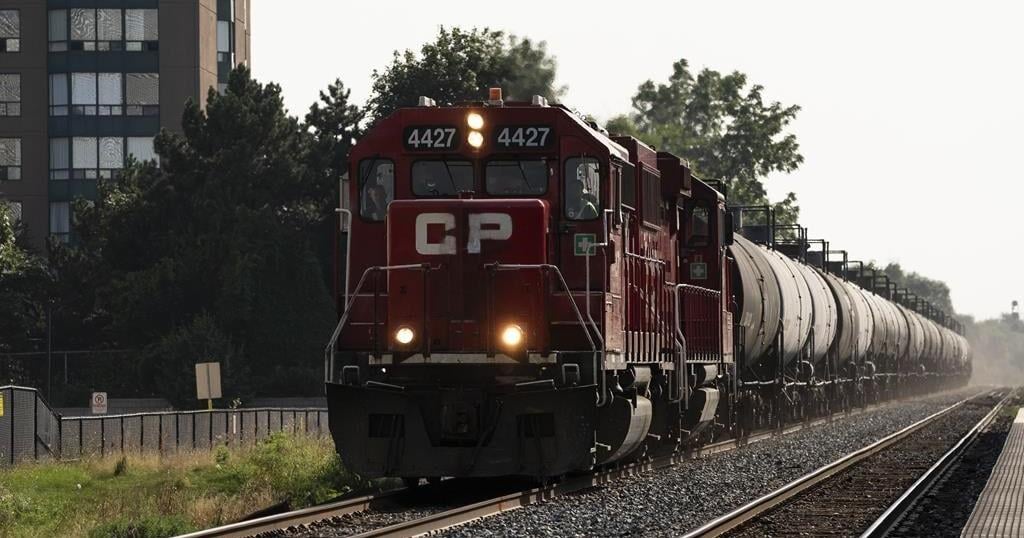MONTREAL – The union representing thousands of railroaders has appealed the federal government’s move that ended last week’s rail shutdown — a work stoppage that halted freight and commuter traffic across the country.
In filings to the Federal Court of Appeal, the Teamsters union challenged directives for binding arbitration issued to a labour board by Labour Minister Steven MacKinnon on Aug. 22, less than a day after the lockout of 9,300 workers by Canadian National Railway Co. and Canadian Pacific Kansas City Ltd.
In response to MacKinnon’s instructions, the Canada Industrial Relations Board ordered the country’s two major railways to resume operations and employees to return to their posts until binding arbitration could produce new contracts.
As well as the government directives, the union is also contesting the tribunal’s decisions.
Paul Boucher, president of the Teamsters Canada Rail Conference, said the actions set a “dangerous precedent” that threatens workers’ constitutional right to collective bargaining.
“Without it, unions lose leverage to negotiate better wages and safer working conditions for all Canadians,” Boucher said in a news release.
The railway companies along with some industry groups have said the minister’s move ended months of needless uncertainty and subdued supply chain turmoil after the Teamsters rejected requests for arbitration.
“CN would have preferred a negotiated settlement,” said spokeswoman Ashley Michnowski in an email.
“However, after nine months of attempting to reach a settlement, it was evident that the Teamsters were not looking for a resolution and were happy to keep applying pressure by inflicting damage to the Canadian economy.”
She noted that arbitration is a neutral process “agnostic to outcome” and aimed at breaking an impasse.
MacKinnon made the back-to-work directive less than 17 hours after the lockouts — as well as a strike by CPKC’s employees, but not CN’s — took effect. He said the talks were deadlocked and Canadian businesses, job security and trade relationships were at stake.
Industry groups had been sounding the alarm for weeks over the economic consequences of a drawn-out shutdown. To ensure no freight would be stranded, CN and CPKC wound down their operations in phases, starting nearly three weeks ago.
Last week, traffic of cargo ranging from car parts to crude oil, consumer goods, grain and potash ground to a complete halt, snarling supply chains.
More than 30,000 commuters in Montreal, Toronto and Vancouver also found themselves unable to board passenger trains that run on CPKC-owned tracks.
The labour board’s Aug. 24 ruling requires railways to continue operations and workers to stay on the job until arbitration wraps up. The court appeals do not affect rail service.
The union filed four separate appeals in a Toronto courthouse late Thursday afternoon that seek a judicial order “quashing” the minister’s directives and the labour tribunal’s decisions related to CN and CPKC.
The applications aim to render invalid those decisions as well the minister’s orders to the board, arguing that the latter were “ultra vires” — beyond the powers of his jurisdiction.
The court filing also says the directives and board decisions breached the union’s freedom of association enshrined in the Charter of Rights and Freedoms.
In 2015, the Supreme Court of Canada ruled for the first time that freedom of association protects collective bargaining, recognizing the right to strike as an “indispensable component” of the negotiation process.
The decision found that a Saskatchewan government bill, which created an absolute ban on strikes by civil servants who the province had deemed — unilaterally — “essential,” infringed on Charter rights.
“There was no ability of the union to challenge that through some sort of third-party mechanism,” Charles Smith, an associate professor of political science at the University of Saskatchewan, said of the essential designation.
“So the question I would have is: does a binding arbitration imposition meet that standard?”
Smith said the Teamsters have a reasonable shot in the courts. He also warned of the implications of the minister’s move should the appeal fail.
“If this is deemed to be the norm, every provincial government will be looking to add a Section 107 equivalent to their labour codes, because it will let them undermine the ability of unions to collectively bargain,” he said.
The Canada Labour Code appears to grant the labour minister broad powers. Section 107 allows the minister to “direct the (labour) board to do such things as the minister deems necessary … to maintain or secure industrial peace” — such as ending a work stoppage via binding arbitration. MacKinnon invoked the clause last week.
The minister’s office said it will let the court process unfold, but declined further comment Friday.
Canadian Pacific also declined to comment. It pointed to recent statements that it believes in collective bargaining but the situation demanded action, given the economic stakes.
After an acrimonious few weeks, the union and railway officials are slated to meet next month for the first time since the work stoppage to discuss a timeline for binding arbitration.
This report by The Canadian Press was first published Aug. 30, 2024.
Companies in this story: (TSX:CNR, TSX:CP)
